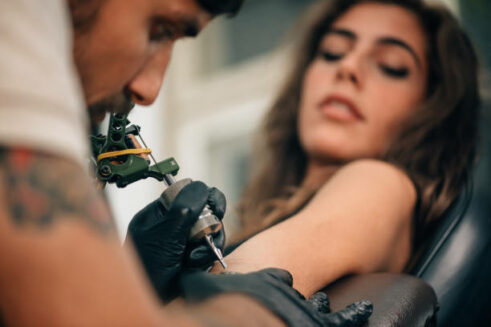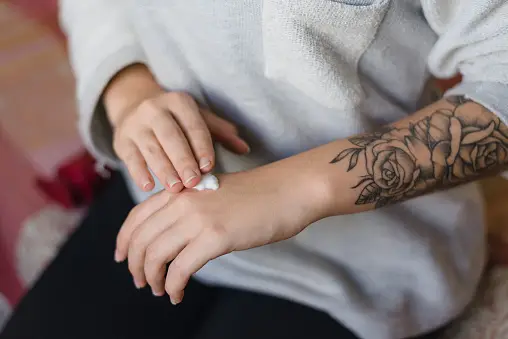What to Know About Tattoo-Numbing Creams
Tattoos, 지울 수 없는 자기표현의 흔적, 마비크림의 출현으로 변신을 겪었습니다.. 장단점을 탐구하기 전에, understanding the nuances of these creams is imperative.
Does Numbing Cream Make It Harder to Tattoo?
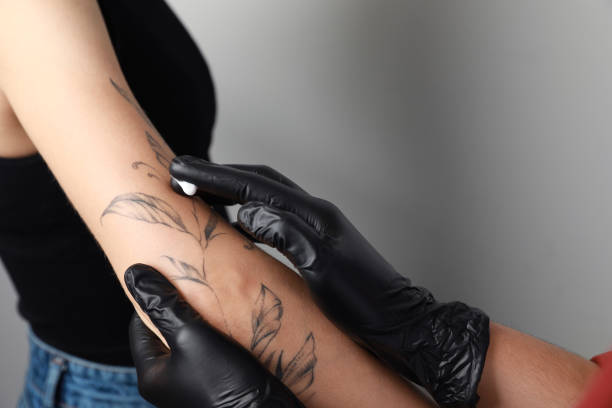
Numbing cream can make it slightly harder to tattoo because it reduces the sensation in the skin. This can make it more challenging for the tattoo artist to gauge the pressure and depth of the tattoo needle. 하지만, many tattoo artists are experienced in working with numbing creams and can adjust their technique accordingly. Some artists may also prefer not to use numbing cream because they believe it affects the quality of the tattoo or the client’s experience during the session.
Why Do Tattoo Artists Not Want You to Use Numbing Cream?
While numbing creams may seem like a panacea for pain, tattoo artists often stand as staunch opponents. The defiance against numbing creams stems from a desire to preserve the authenticity of the tattooing process. Seasoned artists argue that the discomfort inherent in tattooing is a rite of passage, a tangible connection between the individual and their chosen art form. Moreover, numbing creams can distort the client’s pain threshold, potentially leading to longer sessions and diminishing the artist’s ability to gauge the client’s endurance accurately.
하지만, while some tattoo artists remain opposed to numbing creams, a growing number now recommend safe pain relief tattoo creams. In fact, many artists are creating their own private label tattoo numbing creams to enhance the tattoo experience. This shift reflects a recognition of diverse client needs, aiming to balance comfort without sacrificing the authentic connection to the tattooing process. The emphasis is on safety, with artists selecting gentle yet effective ingredients to minimize discomfort. In essence, the tattoo industry is evolving to embrace alternative perspectives and prioritize both artistry and client well-being.
Can You Still Feel Pain with Numbing Cream?
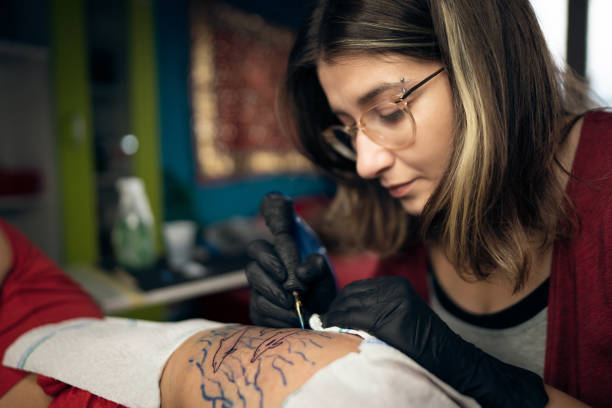
The paradox of numbing creams lies in their ability to dull pain while leaving a residual awareness. While users experience a considerable reduction in pain, numbing creams seldom guarantee complete anesthesia. This nuanced sensation allows for a more tolerable tattooing experience, albeit with a heightened awareness of the process.
Active Ingredients
Behind the veil of numbing creams are potent active ingredients. Common active ingredients include lidocaine, prilocaine, benzocaine, and tetracaine. These substances work by temporarily blocking nerve signals, reducing the sensation of pain in the applied area.
OTC vs. Prescription Numbing Creams
The accessibility of numbing creams spans over-the-counter options to prescription-strength formulations. Understanding the nuances between these choices is crucial for an informed decision.
| 측면 | OTC Numbing Creams | Prescription Numbing Creams |
| Availability | Widely available, no prescription needed | Requires a prescription |
| Strength of Ingredients | Lower concentrations | Higher concentrations |
| Intended Use | Minor procedures like waxing, tattooing | Invasive medical or cosmetic procedures |
| Active Ingredients | 부분 마취, Prilocaine, or Benzocaine | 부분 마취, 테트라 카인, or stronger anesthetics |
| Application Area | Small to medium-sized areas | Larger areas or more sensitive regions |
| Side Effects | Generally well-tolerated | Higher risk due to stronger formulas |
| Cost | More affordable | Can be more expensive |
| Ease of Access | Easily accessible without a prescription | Requires a healthcare provider visit |
| Regulation | Regulated, but less stringent | Strict regulations due to potency and risks |
What Are the Pros and Cons of Numbing Cream?
Navigating the landscape of numbing creams requires a comprehensive exploration of their advantages and drawbacks.
| Pros of Numbing Cream | Cons of Numbing Cream |
| 1. Pain Alleviation: Numbing creams excel at dulling the sharp edges of pain, providing a more bearable tattooing experience. | 1. Risk of Overreliance: There’s a potential for clients to become overly reliant on numbing creams, leading to prolonged sessions. |
| 2. Extended Session Endurance: By tempering pain, numbing creams may extend a client’s endurance during longer, intricate tattoo sessions. | 2. Artificial Alteration of Pain Threshold: Artists argue it may alter a client’s pain threshold, impacting the authenticity of the experience. |
| 3. Increased Accessibility: Numbing creams democratize tattoos, making the experience accessible to those who might shy away due to pain. | 3. Potential for Prolonged Recovery: Clients might realize discomfort post-session late, impacting aftercare practices and recovery times. |
How to Use Skin-Numbing Cream
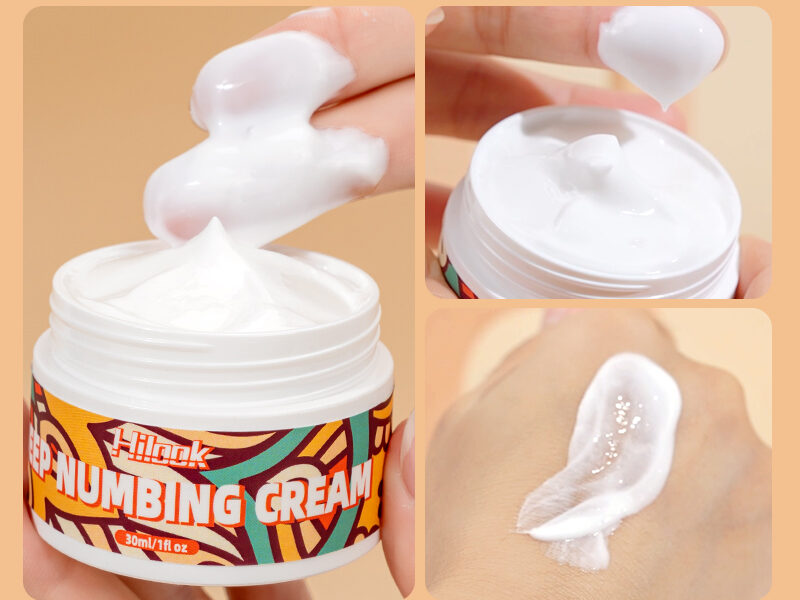
Navigating the application of skin-numbing cream demands attention to detail and adherence to specific guidelines to ensure optimal pain relief during the tattooing process. Here’s a comprehensive guide on how to effectively use numbing cream:
- Choose the Right Numbing Cream: Begin by selecting a high-quality numbing cream. Consider factors such as the concentration of active ingredients like lidocaine and prilocaine, as well as any additional components that may enhance the cream’s effectiveness.
- Consultation with Tattoo Artist: Prior to using numbing cream, engage in open communication with your tattoo artist. Some artists have preferences or specific guidelines for using numbing agents. Understanding their perspective ensures a collaborative and seamless tattooing experience.
- Clean the Skin: Thoroughly cleanse the area where the tattoo will be applied. Use a mild soap and water to remove any dirt, oils, or residues that could interfere with the numbing cream’s absorption.
- 에이pply a Thin Layer: 깨끗하고 멸균된 어플리케이터 사용, apply a thin, even layer of numbing cream to the targeted area. Avoid excessive application, as it may not improve effectiveness and can lead to wastage.
- Cover with Plastic Wrap: Once the numbing cream is applied, cover the area with plastic wrap. This step serves a dual purpose – it prevents the cream from rubbing off onto clothing and helps to create a barrier that enhances absorption.
- Allow Adequate Absorption Time: Each numbing cream has a specific recommended absorption time. 일반적으로, it takes around 20 에게 30 minutes for the cream to reach its maximum effectiveness. 이 기간 동안, it’s advisable to keep the area covered and avoid any disturbances.
- 아르 자형emove Excess Cream: After the recommended absorption time has passed, gently remove any excess numbing cream using a clean, 젖은 천. This step ensures that the skin is prepped for the tattooing process without any interference from residual cream.
- Proceed with Tattooing: With the numbing cream successfully absorbed, your tattoo artist can proceed with the tattooing process. The diminished sensation allows for a more comfortable experience while preserving the integrity of the tattooing ritual.
Additional Considerations
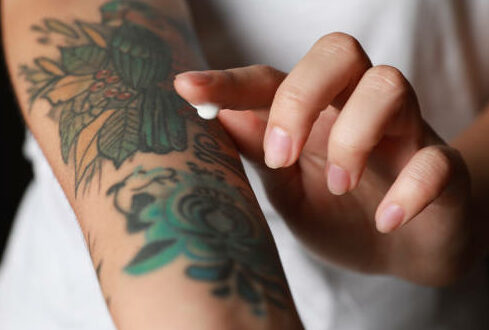
- Patch Test: Before widespread application, perform a patch test on a small area of your skin to ensure you don’t have any adverse reactions or allergies to the numbing cream.
- Follow Manufacturer’s Instructions: Adhere strictly to the instructions provided by the numbing cream manufacturer. This includes recommended application times, dosage, and any specific precautions.
- 의료 전문가와 상담하세요: If you have any pre-existing health conditions or concerns about using numbing cream, seek advice from a healthcare professional before application.
By following these steps meticulously, you can harness the benefits of skin-numbing cream, enhancing your tattooing experience and making the process more tolerable.
Storage
Proper storage of numbing cream ensures its efficacy and longevity. Shielding it from extremes of temperature and sunlight preserves its potency.
Poison Control
While numbing creams are generally safe, the importance of vigilance cannot be overstated. Poison control measures should be readily accessible in case of accidental ingestion.
Summary
In the tapestry of numbing creams, the decision to use or abstain becomes a personal journey. The interplay of pain, art, and the artist’s perspective creates a narrative that is as unique as the tattoos themselves.
자주 묻는 질문
1. Does numbing cream affect the quality of the tattoo?
마비 크림, when used properly, do not compromise the quality of the tattoo. 하지만, their impact on pain perception can vary.
2. Why are tattoo artists against numbing cream?
Tattoo artists often resist numbing creams to preserve the authentic, transformative experience of tattooing and accurately gauge clients’ endurance.
3. Can you use numbing cream for all types of tattoos?
Numbing creams are generally suitable for various tattoo applications, but consultation with the tattoo artist is essential for compatibility with specific designs.
4. Are there any long-term effects of using numbing cream?
While numbing creams are generally safe, prolonged and excessive use may lead to skin sensitivities. It’s crucial to follow recommended usage guidelines.
5. Can you mix different numbing creams for increased efficacy?
Combining numbing creams is not recommended, as it may result in unpredictable reactions. Stick to the recommended dosage and application instructions.
In the intricate world of numbing creams, the decision to use them transcends mere pain management; it becomes a choice that influences the very essence of the tattooing experience. The pros and cons, the active ingredients, and the artist’s perspective intertwine, creating a narrative that unfolds on the canvas of one’s skin.


